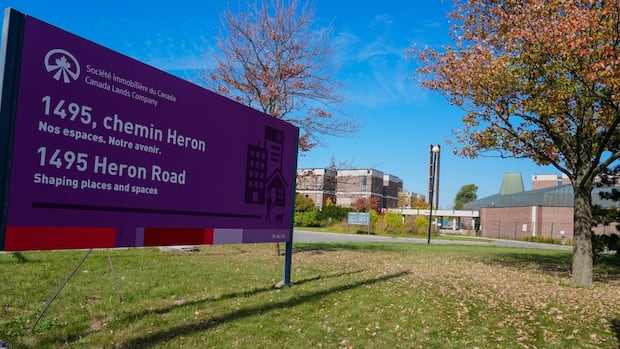OttawaA vacant campus on Heron Road will be among the first six housing projects spearheaded through a new multi-billion-dollar federal program.Build Canada Homes chooses former federal study centre as one of its first six priority projectsFederal agency chooses site on Heron Road for new housing projectBuild Canada Homes will transform an old training centre into housing units, and will use factory-built homes to speed up the process.A vacant campus on Heron Road will be among the first six housing projects spearheaded through a new multi-billion-dollar federal agency that relies on factory-built housing to fast track construction.The 7.3-hectare complex at 1495 Heron Road was built in the 1960s for the Sisters of the Congregation of Notre Dame, who used it as a convent and a Catholic education centre. It was then known as the Campanile campus, a reference to its modernist bell tower. It later hosted a training facility for public servants known as the federal study centre until 2014. It has been vacant since.The campus has been slated for redevelopment through the federal Crown corporation Canada Lands Company (CLC), which acquired it in 2020 and unveiled a plan to put hundreds of housing units on the site.Now, a new program is looking to speed up construction. Build Canada Homes, a $13-billion agency launched last month to accelerate housing construction, is prioritizing the Heron Road complex for “factory-built housing.”Housing, Infrastructure and Communities Canada confirmed that in an email to CBC and said construction is expected to start next year, in the summer or fall.Neighbours feel hope and apprehensionAlta Vista Coun. Marty Carr said it’s clear the federal government wants to move fast on the project. “Discussions have been going on in the neighbourhood over the past five or six years over the future of the site,” Carr said. “So it’s exciting to see we will be moving forward with development on the site imminently.”Kaite Burkholder Harris, executive director of the Alliance to End Homelessness, said it’s “bananas” that the site has been undeveloped for so long.”I think it’s great,” she said of the news. “It’s obviously right on a bus line and to try testing out a factory-built method there seems really promising.”The Guildwood Residents Alliance, which represents nearby residents, has been lobbying to build a seniors village on the site since 2021. While there’s no guarantee of that, alliance president Lynne Davidson-Fournier is still welcoming the prospect of more affordable housing coming to the neighbourhood.Initially known as the Campanile Campus, this convent and Catholic education centre subsequently became a training centre for public servants. It is now one of six priority projects for Build Canada Homes. (Ian Urbach/CBC)”We feel excited, hopeful and apprehensive also because there are lots of undetermined details at this time,” she said.”It’s a test case, so everyone will be watching the development of this site.”Campus has heritage designationWhen Prime Minister Mark Carney announced the creation of Build Canada Homes on September 14, he said that one of the first six projects would be in Ottawa, though he did not specify the site. The six projects were expected to create 4,000 units in total. The federal housing ministry did not explain how many will go on the Heron Road site, and whether it is sticking with the earlier CLC plan. The most recent version called for about 1,100 housing units on the site.A high-level version of that plan has already received zoning approval at city council, though Carr noted that it will still have to go through the additional step of subdivision plan approval.She was confident that the city would cooperate to push the project forward.”I think it’s a great example to show the collaboration between the federal government and the City of Ottawa and how they can expedite needed housing in the community,” she said.The federal housing ministry said Build Canada Homes will use a “direct-build” approach on the project, meaning CLC will operate as a developer “to oversee and lead construction of this affordable mixed-income community.”It could not say exactly how the factory-built homes will be constructed, since it hasn’t yet selected a manufacturer.The campus does have heritage designation, and the federal housing ministry said several buildings will be “repurposed to honour their historical value.” Davidson-Fournier has seen recent drawings and is relieved to see the complex’s most distinctive features — the chapel, theatre and bell tower — are still in the plans.ABOUT THE AUTHORArthur White-Crummey is a reporter at CBC Ottawa. He has previously worked as a reporter in Saskatchewan covering the courts, city hall and the provincial legislature. You can reach him at arthur.white-crummey@cbc.ca.
Tuesday, 7 Oct 2025
Canada – The Illusion
Search
Have an existing account?
Sign In
© 2022 Foxiz News Network. Ruby Design Company. All Rights Reserved.
You May also Like
- More News:
- history
- Standing Bear Network
- John Gonzalez
- ᐊᓂᓈᐯᐃᐧᐣ aninâpêwin — Truth
- Creation
- Beneath the Water
- Olympic gold medal
- Jim Thorpe
- type O blood
- the bringer of life
- Raven
- Wás’agi
- NoiseCat
- 'Sugarcane'
- ᐅᑳᐤ okâw — We remember
- ᑲᓂᐸᐏᐟ ᒪᐢᑿ
- This is what it means to be human.
- Nokoma
- Kanipawit Maskwa
- Native American names












